Teacher strikes LIVE: latest updates for schools
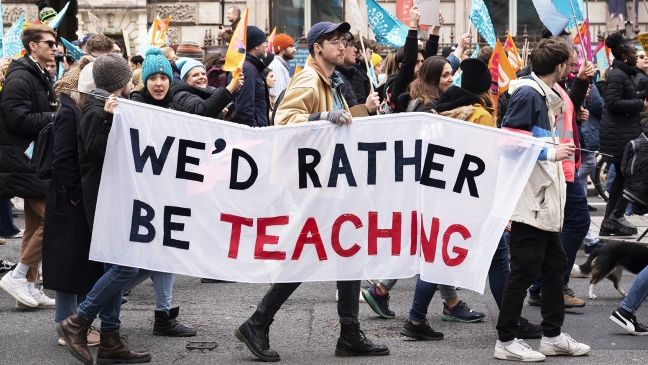
Thursday 16 March
17:52
Six days of strike action over - so, what happens next?
Today marks the end of the strike dates that were first announced by the NEU teaching union after its members voted to take this action over pay.
A national teacher strike at the start of last month was followed by three regional strike days two weeks ago.
After 50,000 teachers reportedly attended a rally in the capital yesterday, alongside other striking workers, today’s action was more focused on local picket lines and putting pressure on MPs.
With no further strike dates yet announced by the NEU, the sector will be watching to see if talks begin again between the Department for Education and all four unions.
The education secretary Gillian Keegan had previously set a precondition for talks with the NEU, saying that she would not meet until strike action was paused.
Dr Mary Bousted, joint general secretary of the NEU told Tes yesterday that Ms Keegan had “run out of tarmac” for “excuses” not to negotiate after this week.
17:42
DfE data shows drop in number of schools fully closed
Department for Education data from the last two strike days this week suggested that 47 per cent of schools were open but restricted attendance, and another 6 per cent were fully closed.
This is a drop in the number of schools that were fully closed compared with the first day of NEU national strike action last month, when 9.3 per cent were shut to all pupils.
However, it also represents an increase in the number of schools that restricted attendance. On the 1 February strike day, 44.7 per cent of schools did this, according to government data.
There was also a slightly higher proportion of schools fully open during this week’s strike days (47 per cent yesterday and 46 per cent today, compared to 45.9 per cent on 1 February).
16:47
NHS pay offer raises hopes of end to teacher dispute
Away from the teacher dispute, unions have suspended further strikes by ambulance and other NHS staff and will recommend acceptance of a new pay offer to NHS workers.
The offer includes a permanent 5 per cent pay rise on all pay points for 2023-24 and a one-off payment this year of at least £1,655.
Geoff Barton, general secretary of the Association of School and College Leaders, said it was encouraging to see the progress being made in other areas of the public sector.
He added: “We remain hopeful that there will soon be a resolution in the education sector that addresses the serious concerns around pay and conditions and brings the industrial dispute to an end.”
A DfE spokesperson said: “This deal with nursing and ambulance unions shows that the government is committed to serious talks with unions about pay, and is willing to reach a fair settlement which recognises the hard work of public sector workers while acknowledging the wider economic pressures facing the country.
“We again urge the NEU to enter negotiations with us and prevent further school strikes, which are so damaging for children’s education.”
15:25
NEU urges teachers to write to MPs over pay dispute
Today, the NEU has asked members to write to their MPs to urge the government to enter into pay talks.
It follows a series of exchanges between the union and the government this week in which education secretary Gillian Keegan urged the union to call off its strike in order for talks to take place.
The NEU rejected this as a “new and unusual” approach to pay negotiations.
It has today tweeted pictures of NEU teacher members outside the office of Rossendale and Darwen MP Jake Berry as part of its call for teachers to lobby MPs.
14:20
School leaders’ union shows support for the action
Earlier this week, the DfE held separate meetings with other trade unions while insisting that the NEU needed to call off its strike before formal talks could begin. This included talks with the NAHT school leaders’ union.
Today, the NAHT posted its support for the NEU action with pictures of headteachers joining teachers on the picket line.
12:52
Teachers take to picket lines on second day of strike action
The national demonstration may be over but on the second day of strikes, teachers in the NEU have been taking to picket lines outside schools to make their case for a real-terms pay rise.
On Twitter today, the NEU has been highlighting this with images shared from outside schools around the country.
09:30
As teachers take part in the last day of planned strikes today, the NEU is asking members to write to their MPs to urge the government to enter into pay talks.
The NEU’s national executive committee plan to meet next week on 25 March when more strike days could be announced.
However, as news emerged today that health unions could be close to settling their dispute following government intervention, the NEU is pressing ministers to follow suit and enter formal talks.
In a statement, the NEU said: “This is both an industrial and a political dispute so it will be crucial to exert political pressure on the government to win a fully funded, inflation-plus pay rise.
“We want to resolve this dispute. We want the government to negotiate with us. We need to make sure that MPs hear this message loud and clear.
“Please write to your MP and ask them to use their voice in Parliament to lobby the government for the pay rise teachers deserve,” it adds.
Yesterday, NEU joint general secretary Kevin Courtney told a rally of 50,000 teachers in Trafalgar Square that teachers he had met on the march were telling him how the crisis was hitting lessons.
“Teachers from a primary school in Haringey told me that there has been no permanent teacher in one of their classes since Christmas and they were relying on teaching assistants - those TAs underpaid.
“A deputy headteacher I spoke to said their school had completely abandoned teaching computer science. I say the government has got to listen to that,” he added.
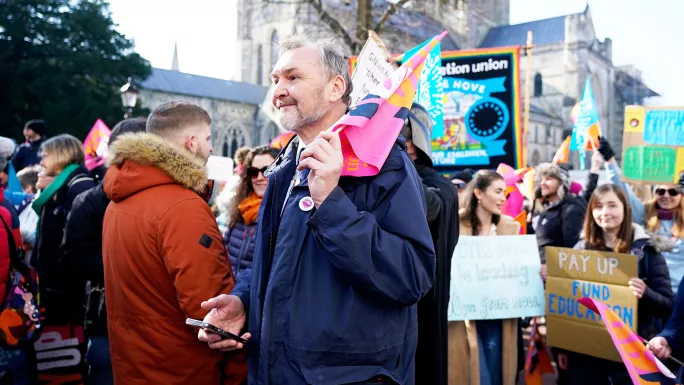
Wednesday 15 March
16:09
Watch: Teachers urged ‘to be strong enough to go again’ if demands are not met
Addressing the crowds at the London rally today, Paul Whiteman, the general secretary of the NAHT school leaders’ union, told striking teachers to “be proud of the action you take today…and colleagues, be strong enough to go again if your demands for a fair deal are not met”.
He also said teachers had been “faced with a government more concerned with a headline than with making progress” on negotiations.
15:02
Teachers gather for London rally
Teachers have gathered in Trafalgar Square today for a rally as the NEU holds its fourth day of strike action in its ongoing dispute with the government over pay.
Tes reporter Matilda Martin is reporting from the event.
11:15
Watch: Bousted criticises government for ‘spurious’ conditions delaying pay talks
The government is running out of “excuses” for not holding talks with the NEU, one of its joint general secretaries has told Tes this morning.
The DfE has said that it would only enter formal talks with the union if it postponed its planned strike action, but after this week the NEU does not have any definite strike days lined up.
Speaking from a picket line outside Tower Bridge Primary School in south-east London this morning, Dr Mary Bousted said Gillian Keegan was “running out of tarmac on excuses” for not inviting the union in for talks.
She also said the union was having to take strike action “because the secretary of state for education is putting spurious preconditions in the way of us getting into the DfE and negotiating a settlement to this dispute”.
After this week of strike action, Dr Bousted said it would be “great” if Ms Keegan would “just begin to negotiate”, adding “we’ve wasted weeks”.
09:48
Teachers unsure of staying in profession
Tes spoke to Jess and Natalie, two Year 4 classroom teachers in London who are both in their fourth year of teaching and are taking part in today’s strike action.
On whether they will stay in the profession, Jess said it was “difficult” owing to the “stress levels” and the “workload”.
Natalie said she “loves the job” and “loves going in each day” but the job was “so much” and it was “hard to see”.
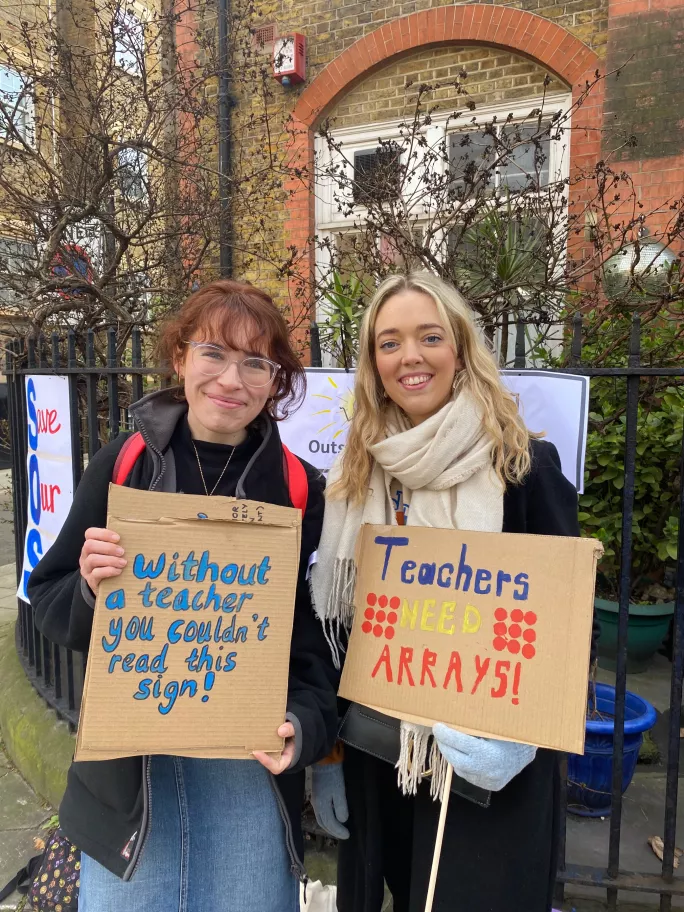
09:14
Tes reporting from teacher picket lines today
Tes reporter Matilda Martin is reporting from school picket lines this morning as teachers in the NEU take part in the latest day of strike action.
Her coverage will feature here during the day and you can follow her on Twitter for all the latest updates.
08:38
NEU says Keegan is ‘out of step’ on pay
Education secretary Gillian Keegan “is out of step” on pay, Kevin Courtney has said this morning.
Mr Courtney told Times Radio: “We have suspended our strike action in Wales today and tomorrow because we had a new offer and we’re consulting members on it.
“It is Gillian Keegan who is out of step - she just won’t sit down and talk with us and make offers to resolve the dispute.”
He added: “Gillian Keegan is terrified of us calling strikes because she knows we’ve got parental support. We are using the strike to create pressure on the government to make a proper offer which helps our children’s education.
“Our members are on strike today actually for the highest motives - they are trying to improve the education of children because they are seeing the disruption that is happening in our schools every day.”
08:21
NEU says 300,000 teachers will be on strike today
The NEU has claimed that there will be 300,000 teachers on strike today.
In a post on Twitter this morning, the union said: “We will be assembling at lunchtime for a march and rally in Trafalgar Square. It’s time for Gillian Keegan to come to the table.”
08:15
Strikes on hold in Wales
The NEU has however called off its strike action in Wales this week to allow its members to consider a new pay offer from the Welsh government.
Over two years, the NEU says, the pay offer amounts to an 11.8 per cent rise for all teachers - comprising 6.5 per cent this year, followed by 5 per cent next year, plus a 1.5 per cent non-consolidated payment this year.
The pay award recommended by the Independent Welsh Pay Review Body in July was for a 5 per cent rise this year and 3.5 per cent next year.
The revised offer in Wales also includes a “no detriment principle” so that should there be a higher pay settlement in England, Wales would match that pay award.
08:12
DfE and NEU remain at loggerheads in England
In the run-up to this week’s strikes, education secretary Gillian Keegan held separate meetings with the three other education unions: the NASUWT, the Association of School and College Leaders and the NAHT.
But the Department for Education insisted it would only speak to the NEU for formal pay talks if the union called off its strike.
The union told its members on Monday night that it would be going ahead with this week’s two strike days and accused the government of playing “distraction politics” by staging the separate meetings.
The union had said previously that it would postpone strike action if ministers produced a pay offer that could end the teacher pay dispute.
Yesterday, Ms Keegan and the NEU exchanged letters reiterating their positions. The NEU’s joint general secretary Kevin Courtney criticised what he described as the education secretary’s “new and unusual” approach to pay.
07:31
Teachers to march in London for today’s strike
Teachers in the NEU will be among hundreds of thousands of workers expected to strike today on Budget day in what threatens to be the biggest walkout since the current wave of industrial action across several trade unions started last year.
The NEU teaching union is holding two consecutive strikes days this week following its regional action two weeks ago.
Others taking part in strikes today include university lecturers, civil servants, junior doctors, London Underground drivers and BBC journalists
Today, the NEU is holding a national demonstration and march in London, culminating in a rally at Trafalgar Square.
Thursday 2 March
17.30
Watch: NEU members turned out in Gillian Keegan’s constituency on the last regional teacher strike day
Teacher strike rallies will be held in constituencies of Conservative MPs with marginal seats, the NEU joint general secretary Kevin Courtney warned today.
He told Tes: “We’re going to demand that [Conservative MPs with marginal seats] say something about education funding, and the funding and investing in the next generation of our children.
“We are going to follow up on all of these things. We have parental support, and we can use that to make political pressure.”
He added that members will be “reaching out to parents” and were “prepared to take more strike action” if necessary.
Watch the video of the rally in Chichester and Mr Courtney’s comments in full here:
17.13
Cost pressure on teachers and school budgets
Tes senior analyst Gráinne Hallahan has been back on the airwaves on BBC Radio London speaking to Shay Kaur Grewal today, as teachers went on strike in the capital.
She talked about the pressures faced by teachers and schools as a result of staff pay rises that have not been fully funded and are also below the level of inflation.
You can listen to the full interview here.
14.00
World Book Day moves in some schools
Today is World Book Day, but with some schools closed or partly closed owing to strike action, many made the decision to move marking the occasion - including having children attend school in costume - to tomorrow or, in some cases, yesterday.
Dan Morrow, chief executive of Dartmoor Multi Academy Trust, said that four of the primaries in his trust had moved the day to Friday 3 March, and three had moved it to Wednesday 1 March.
“Engagement with reading is imperative to the success of our pupils and the day is always a highlight of the school year, filled with fun and creative activities aimed at celebrating and encouraging a love of reading”, he added.
Mary Bousted, joint general secretary of the NEU, said schools would use their “own judgement” on how best to celebrate World Book Day “while also respecting the decision of NEU members at their school to reluctantly take strike action”.
12.00
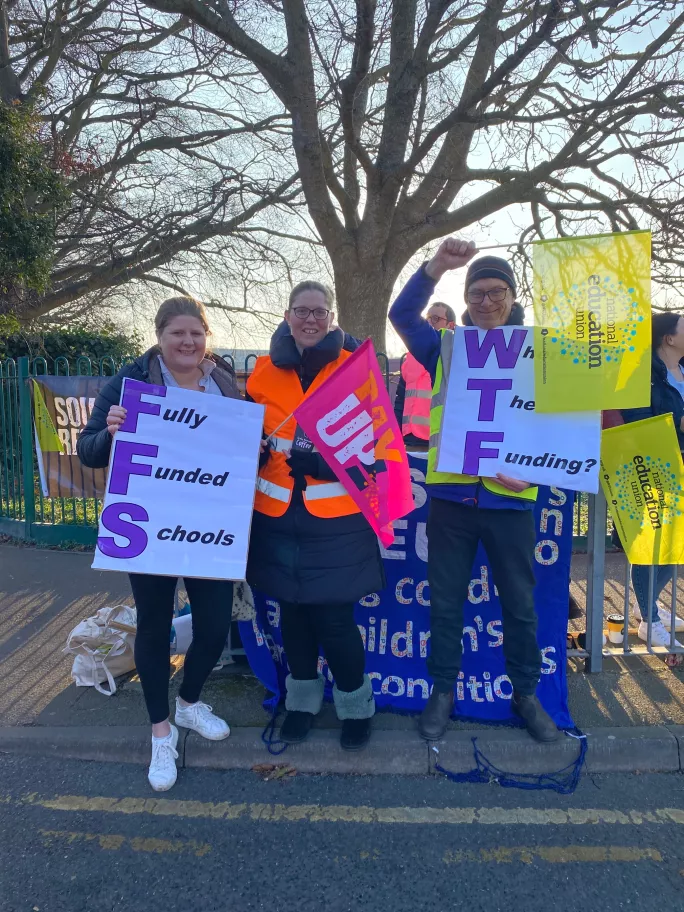
Geography teachers Steph Woodard, Nick Peters and Eloise Marner spoke to Tes from a picket line in education secretary Gillian Keegan’s constituency this morning.
Mr Peters, who has been in teaching for 17 years, said the main issue affecting his school is recruitment problems. He said Ms Keegan needed to talk with the unions and “listen”.
Ms Marner, who has been in teaching for eight years, said that the students were becoming “more supportive” and understood why their teachers were taking action, adding “we’re doing this for them”.
10.30
‘Real determination’
Speaking to Tes about how the regional strike days have unfolded, joint general secretary of the NEU Kevin Courtney said support among the profession has been strong.
“We’ve had more picket lines in many areas, and since the first strike day [on 1 February] another 7,000 members have joined the union, taking us to 50,000 more members in total. That’s not about growing the size of the union, it’s something about the degree of support there is in the profession for the action that we’re taking.”
Mr Courtney said there was a “real determination that there is a moment that we have to seize to get the government to invest in our schools and our colleges”.
08.30
6 in 10 parents back teacher strikes
Some 60 per cent of parents and 48 per cent of Britons support teachers taking strike action and share concerns about the lack of education funding, according to a new poll.
Around 40 per cent of the 2,187 adults, polled by Ipsos last week, said they were concerned about the impact industrial action was having on their children’s education, but 60 per cent were more concerned about the lack of education funding in general.
Reacting to the findings, Dr Mary Bousted, joint general secretary of the NEU teaching union, said: “While no teacher wants to be on strike action, we are grateful for the support of parents and do not take it for granted.
“Many understand first-hand the issues faced by schools and colleges and their children’s teachers. They need no persuasion that there is disruption every day of the school year, thanks to the government’s poor decision making and short-sighted policies on education.”
Wednesday 1 March
18.12
WATCH: Second day of regional teacher strikes unfolds
The NEU teaching union held its second day of regional teacher strikes today in its Midlands and Eastern regions.
Another strike is planned tomorrow in London, the South East and South West.
Tes reporter Matilda Martin was on the scene at picket lines and at a major rally in Cambridge today, speaking to union leaders and teachers about why they are taking action in this ongoing dispute with the government over pay.
The union’s joint general secretary Kevin Courtney said that the NEU executive would begin discussing more strike dates in the summer term as he accused the government of coming up with “distraction after distraction” rather than making a pay offer to resolve the dispute.
You can watch our video story of the day here:
17.59
Teachers ‘want to see understanding’ from government
Simon Pepper, a classroom teacher at a primary school, who attended today’s NEU rally in Cambridge, said there are “so many issues in schools and there’s not enough funding to go around”.
“When I look at my 30 children in my class I’m not getting to them, I’m not educating them in the right way. That’s happened in the last five years, slowly the money’s been sucked out of education and we’re at a point where it’s broken and it needs to be fixed.”
Mr Pepper said he wanted to see “a bit of honesty and understanding” from government.
He told Tes that teachers “are at a point now where they have to go out on strike. It’s a sad, sad situation.”
16:00
Tes answers questions over teacher strikes
Tes senior analyst Gráinne Hallahan has appeared on BBC London Radio speaking to Eddie Nestor and answering listeners’ questions today in advance of the NEU’s London regional strikes tomorrow.
You can listen to the interview in full here.
15.10
‘We are demanding this government invest in this generation of children’
Kevin Courtney has told the government that they must invest in education.
Speaking at a rally in Cambridge, he said: “Teachers see that there are children in GCSE chemistry classes without a chemistry teacher, GCSE maths classes without a maths teacher. They see a succession of temporary teachers instead of permanent staff.
“I think we are taking action for a high moral purpose. We are demanding that this government invest in this generation of children - the generation hit so hard by Covid. We demand the best for those children. We demand funding for their schools and colleges, and we demand investment in the people who teach them. So, we’re calling on this government: invest now.”
13.33
Listen: The latest on teacher strikes explained
Tes senior analyst Gráinne Hallahan has appeared on BBC Radio 2 speaking to Jeremy Vine today on the second day of the NEU teaching union’s regional strikes.
You can listen to the interview in full here.
12.15
Summer term strike dates will be discussed by NEU this month
The NEU is set to discuss further strikes during the summer term at a meeting later this month, Tes has been told.
Kevin Courtney, the NEU’s joint general secretary, told Tes that the union was not “rushing” towards more industrial action as it wants a settlement to the pay dispute, but said that further strikes “could well” be needed.
However, he said if future summer-term strikes did happen, they would not be held during exams.
Asked if further strikes in the summer term could follow if no resolution to the dispute is found soon, Mr Courtney said: “Yes, there could well be more dates in the summer term.
“We will be thinking about those at our executive [meeting] on 25 March in order that we can give notice for those strike days. We’re not rushing towards that, because we want to find a settlement to the dispute. We want the government to put some money in and invest in this generation of children.”
11.11
Special school leader warning on staff shortages and ‘untenable’ funding
Speaking on the picket line this morning, Peter Nelmes - senior leader at Castle School, a special school in Cambridge, and NEU member - told Tes that the level of funding it receives “is becoming untenable for our school”.
He also warned about the impact of staffing shortages.
Mr Nelmes said: “We’re a special school and we’re particularly proud of our therapeutic approach. That’s becoming increasingly difficult to maintain, to meet children’s needs.
“Because of staff shortages, we sometimes struggle to get children into our hydrotherapy pool; because of staff shortages, it’s difficult to meet children’s needs so that their behaviour is managed in a professional manner.
“It’s just right across the board. We’ve seen services shrink over the last 10, 15 years. There are fewer outside professionals that come in. Everything is just shrinking and it’s the children that are suffering.
“It feels like all the caring professions are being squeezed to the point at which we can no longer function.”
09.39
‘It’s important we see the colour of the money’
Speaking to Tes from a school picket line this morning, Kevin Courtney, joint general secretary of the NEU, said: “There’s been some progress, because the secretary of state sent us a letter saying that she’d agreed with the prime minister and the chancellor and that she could engage with talks aimed at settling the dispute.
“We take from that there is some money available to settle the dispute. However, they aren’t negotiating in any serious way. They say we’ve got to postpone the strikes before they’ll even tell us what sort of offer they might make.
“That isn’t the sensible way forward. It’s really important we see the colour of the money, we see what they might be prepared to do, because our worry is they aren’t going to talk about pay this year.”
8.30
NEU teacher members in the English regions of East Midlands, West Midlands and Eastern are striking today.
Tes reporter Matilda Martin will be joining joint general secretary Kevin Courtney on the picket line and at a rally later this morning in Cambridge.
The Tes news team will be bringing you news and developments as they happen here over the course of the day.
Tuesday 28 February
17.55
WATCH: Northern rallies launch the NEU’s wave of regional strikes
The NEU teaching union’s three days of regional teacher strikes began in the North today with union leaders addressing large rallies in Leeds, Manchester and Newcastle.
The NEU’s Northern, North West and Yorkshire and the Humber regions held strikes today. Tomorrow, it will be striking in its Midlands and Eastern regions and on Thursday, action will take place in London and the South East and South West regions.
At noon today, large crowds marched through Leeds to a rally in Millennium Square, where joint general secretary Kevin Courtney addressed the striking teachers.
Speaking to Tes, he said that ministers now needed to invest in the people who work in schools and colleges as he accused the government of attempting to ignore pay concerns until industrial action was imminent.
Here is our video round-up of the day.
17.13
‘The government has to realise they have to make us an offer’
Kevin Courtney, joint general secretary of the NEU teaching union, said ministers attempted to ignore their calls for more pay and had not expected teachers to meet the threshold for strike action.
Speaking to Tes at a rally in Leeds city centre, he said: “My message to the government today is they need to invest in this generation of children. They need to invest in our schools and colleges and the people who work in them.
“They ignored us when we wrote to Nadhim Zahawi in the summer, to James Cleverly after that and to Kit Malthouse after that. They only meet with us when we threaten strike action. They didn’t think we would meet the thresholds. Now they are still not making any offers to end this dispute.
“They have to realise they have to make an offer and it has to be an offer which is investing in this generation of children.”
15:12
‘I absolutely love my job…but hate what the government is doing to our profession’
Bradford teacher Rachel Hesselwood was cheered loudly as she said that she loved her job, but hated what the government was doing to the teaching profession.
She was among the speakers who addressed a rally in Leeds today after hundreds of striking teachers from across Yorkshire marched through the city centre
Speaking to Tes after her speech, she said: “Most of the time I absolutely love my job, I love my colleagues, I love the children that I work with, but I hate what the government is doing to our profession. I hate that they underfund it so chronically that when our colleagues are off sick we are left having to double our workload.
“I hate that our SEND children don’t get the support they need. I hate that children with mental health don’t get the support they need and we are left to deal with their crises and we are completely untrained for that.”
15:01
‘Momentum is really with our dispute’
Speaking at the rally in Leeds city centre, the NEU teaching union’s past president and leadership candidate Daniel Kebede said that momentum for the action was growing.
He said: “At the moment in Newcastle, there [are] more pickets than last time we were on strike. In Leeds and around Yorkshire and the Humber, the same. And over in the North West, we have more pickets than last time we were on strike.
“Momentum is really with our dispute. Teachers are not wavering in their support for this action because change has to come from the government.
“It is untenable that they continue to not negotiate to not make a serious offer and to also recommend a further pay cut for next year.”
Mr Kebede was referring to the latest Department for Education submission to the School Teachers Review Body (STRB) in which it proposed a 3 per cent pay rise for experienced teachers - a proposal that has been criticised as being a real-terms cut.
14:33
Meanwhile in Scotland, two days of strike action are underway
Members of the EIS and NASUWT teaching unions have started two days of national strike action as part of the long-running pay dispute, and have said there is a growing number of teachers on picket lines.
12:11
Big turnout for Leeds city centre rally
Our deputy news editor John Roberts is in Leeds city centre, where NEU joint general secretary Kevin Courtney is set to address the crowds.
10:45
Better staffing picture makes it easier for some schools to partially open this time
Warren Carratt, CEO of Nexus Multi Academy Trust, a trust of special schools in Yorkshire and the East Midlands, said that disruption was similar to the previous strike at schools in his trust - apart from one school that was closed during the last strike but is partly open today.
He said the school had the same number of staff on strike, though this time they were able to open because they had a better picture of what to expect in terms of the number of staff taking action.
However, a headteacher at a primary school in Cheshire told Tes the disruption was on a “similar level” to the first national strike day earlier this month, with one fewer member of staff taking strike action.
He told Tes that the school was fully open with a reduced timetable for two classes, as it was on the national strike date.
08.55
Teachers striking for a ‘high moral purpose’
Kevin Courtney, joint general secretary of the NEU teaching union, said this morning that striking teachers are taking action for a “high moral purpose”.
Mr Courtney told Sky News: “We sincerely regret the disruption to children’s education and parents’ work and home lives.
“We think we’re taking action for a high moral purpose to try and get the government to invest in this generation of children.”
He also added that many children face disruption from understaffed schools or underqualified teachers because “the government has let teacher recruitment and retention fall to such perilous levels”.
07.45
‘Around 200,000 teachers to strike over next three days’
Around 200,000 teachers across England and Wales will strike over three days this week in the long-running dispute over teacher pay, according to the NEU teaching union.
The action starts today in the North of England with the majority of schools expected to either restrict access to some pupils or fully close, the NEU said.
Teacher-members of the NEU are set to strike in the unions’ Midlands and Eastern regions in England on Wednesday, with further walkouts taking place across Wales and the south of England on Thursday.
You can read the full story ahead of today’s strike action here.
07.35
The Tes magazine teacher strikes live blog is back up and running today for the first of three days of action planned this week by the NEU teaching union.
We will be bringing you regular updates with all the reaction and news from the government, unions and schools.
Today, teachers who are members of the NEU will be taking part in strike action in the union’s Northern, North West and Yorkshire and Humber regions, and the union’s leaders Kevin Courtney and Dr Mary Bousted are set to address rallies taking place in Leeds and Manchester.
Wednesday 1 February
18:38
Today’s strike, in review
As the day draws to a close, watch our video report featuring teachers and leaders at picket lines and rallies, setting out why they chose to strike today:
You can read our full story on how the day panned out, with more views from teachers, here.
18:15
Keegan warned she is ‘on notice’
Education secretary Gillian Keegan has been told she has been “put on notice” to come up with a new pay offer to avoid a repeat of today’s teacher strike.
You can read the story here.
17:38
‘We’ll be back next month’
As evening sets in, what do teachers think the next step might be?
James Hibbard, a head of year at Myton School, Warwick, where NEU members were striking today, believed an agreement with the government would not be forthcoming before a second strike involving members in the North of England on 28 February.
He told the PA agency: “I think we’ll be back on the 28th.
“I’d like to think it will show to people there’s a little bit of disruption.
“That’s going to help people realise the struggle that we’re in but I don’t necessarily think the government will listen to that straightaway.
“But I think they need to start thinking about the way funding streams work and how we can get a fully funded education system.”
17:11
Did supply teachers avoid covering the strike?
Niall Bradley, chair of the National Supply Teachers Network, said that many supply workers who had made themselves available to work today never got the call in the end.
He said: “It would appear the schools that are open have been only partially open - with a primary focus on Year 6 and a secondary focus on Years 11 and 13 - and many lessons have been covered using non-striking teaching assistants, rather than being taught by qualified teachers.”
16:45
More than half of schools fully or partly closed
The Department for Education has released data showing how schools were affected by today’s strike action:
16:00
More than half of teachers walked out in over a third of schools
Nearly all schools said they had teachers who took part in strike action today, according to a snapshot poll of headteacher members of the Association of School and College Leaders.
15:45
After tweeting his support for the strikes’ aim to secure more investment in pupils’ education this morning, Steve Chalke, founder of Oasis Community Learning, told Tes that he is in “two minds about what will happen [next]”.
“We hope that the government will sit down and talk about the issues,” he said.
“Things in government won’t change until they do. Governments don’t show uncertainty. But they do change course, as we saw with the Marcus Rashford campaign during Covid.”
He added: “The cause of the NEU is right and a good one - it’s driven through a concern about the quality of education for our children.”
15:30
‘Since lockdown, a lot of children have fallen behind and there’s not the investment there to help them catch up’
Lewis Miles, a Year 6 teacher at Peter Lea Primary School in Fairwater, Cardiff, explained why he had joined fellow NEU-member colleagues on picket lines across England and Wales today: “One of the main reasons that I’m here is because of the children I teach and the underinvestment in schools.
“Since lockdown, a lot of children have fallen behind and there’s not the investment there to help them catch up.
“I just think a lot of people think it’s just about wanting more money and it is partly about that, but it’s also wanting more investment for schools and help for children.”
Mr Miles said he had heard reports from colleagues working in secondary schools that some teachers were being asked to teach subjects they were not qualified in.
“Art teachers are teaching maths and things like that, which is a huge concern because they haven’t got the investment to recruit teachers,” he said.
“If my child was going into a senior school, I would be really concerned about that.”
He continued: “The reason why we’re striking is hopefully to get more money into schools, which will benefit the children in the long term.
“Short term, they’re going to miss a few days, which is unfortunate because it is a strike, it is meant to be disruptive.”
15:05
Headteachers’ union offers support
Speaking to the crowds outside Downing Street, general secretary of the NAHT, Paul Whiteman, said that the school leaders’ union offered its “support to those colleagues taking action today”.
Referring to the recent strike ballot of NAHT members, which failed to meet the legal threshold, Mr Whiteman said the union would “ballot our members again if no progress is made”.
He added that it was the government “alone” who were responsible for the “decline in teaching careers”.
He said: “My appeal to government is to end the meetings of empty offers designed to provide only a veneer of negotiation and instead enter meaningful talks. But until then, colleagues, I say to you: stand firm and stand strong.
“This is about saving education for children.”
14:50
‘We’re disappointed with you,’ Bousted tells Keegan
Speaking outside Downing Street today, NEU joint general secretary Mary Bousted reacted to the education secretary’s “disappointment” that teachers were striking.
Dr Bousted said: “I have to tell Gillian Keegan: we are very disappointed with you. We are very disappointed that your government has sat on its hands and done nothing month after month in the cynical belief that we would not meet the ballot threshold.”
She added that there were 27 days before the next strike, and said: “Rather than going round the TV studios as you did this morning, saying there’s no more money, here’s a lesson for you: stop the anti-teacher rhetoric, stop the anti-union rhetoric, stop the gimmicks, stop the tricks. Get into a room, sit down and negotiate.”
14:41
Teachers’ frustrations ‘not down to poor leadership’
Geoff Barton, general secretary of the Association of School and College Leaders, has hit back at an opinion piece from former headteacher and DfE special adviser Mark Lehain, warning that “unreasonable workloads, an over-emphasis on marking and other paperwork and poor classroom behaviour” were the “result of poor leadership - not a lack of money”.
Mr Barton said: “It’s a nice try by Mark Lehain to shift the blame for workload on to school leaders. But he knows full well that it is a product of the government’s underfunding of schools since 2010, an excessive accountability regime and the fact that schools frequently have to pick up the pieces caused by government cuts to everything from family support services to careers advice and the lack of sufficient children’s mental health care support.”
School leaders “do their absolute best” to minimise the impact on their staff, he added, but were constrained by having to do “more with less”.
He also pointed to “the dire shortage of funding for interventions and pastoral support that help to address challenging behaviour”.
14:34
Office workers pause to watch teachers march past
14:01
How were strikes covered in 1919?
The Tes archive stretches back 112 years and is a vital public record demonstrating just how persistent a problem teacher pay and conditions have been since the early 1900s.
Back in 1919, a reader chastised a comment piece in Tes that had lambasted strikes, stating that “the profession, without which all other professions are impossible, remains the worst paid of all”.
And in 1954, a Tes journalist detailed the worldwide strikes by teachers, noting that the profession had been unable to prevent the attrition of their position in society since the Second World War.
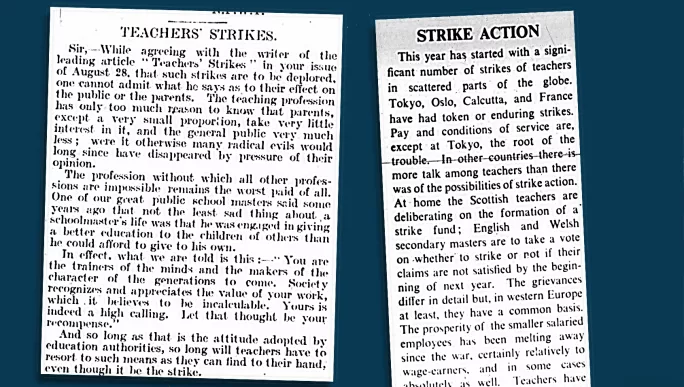
In 1980, increasing levels of strike action prompted then education secretary Mark Carlisle to take the familiar line of lamenting the impact on pupils, rather than addressing the negative impact on pupils of underpaid teachers and underfunded schools.
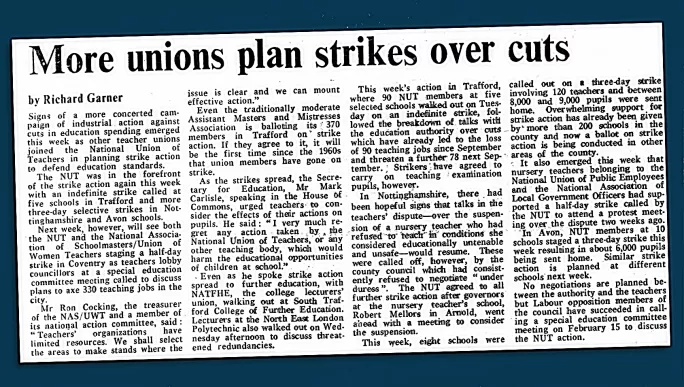
And finally, in 1985 we reported how 100,000 members of what was then the NUT had taken strike action already, and how strikes would intensify in the coming weeks.
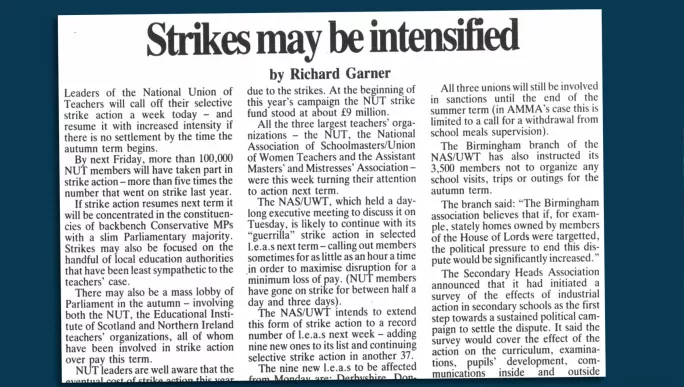
13:55
‘D&T teachers made PPE in our spare time - now the government needs to pay us back’
A councillor and secondary school teacher on the picket line, who made PPE for schools and the NHS during lockdown, has said that those striking are at “breaking point”.
Rochelle Charlton-Lainé, an art and design technology (DT) teacher, told the PA news agency from a rally at the marketplace outside of Durham Town Hall: “I love teaching, I love being in the classroom and seeing kids have those lightbulb moments in the classroom, but the reason I am striking today is because we’ve not seen a rise in our salary for many years now.
“And as a DT teacher, there’s some irony here - during the lockdown, all the DT teachers banded together to make personal protective equipment (PPE) for schools and the NHS.
“I delivered PPE that we made in schools, we sat and made visors and we made thousands and now it’s time for [the government] to pay us back.”
Ms Charlton-Lainé added that there are around 400 people at the rally, with NHS workers, teachers and postal workers in attendance.
“We are all standing in solidarity and I think everybody is just really at breaking point.”
13:15
Tes in the news
Tes senior analyst Grainne Hallahan has been speaking with a range of broadcasters today about the strike and our stories on it - including on BBC Radio 5 Live (link below):
She also spoke on BBC Radio London about how schools in the capital have been affected by the strikes:
12:32
‘Parents have been supportive’
As we head into lunchtime, the news from picket lines and schools is that strike action being taken today has taken place amid a “settled” atmosphere.
Wayne Norrie, CEO of Greenwood Academies Trust, which has 37 academies educating approximately 18,000 pupils across seven local authorities, said there had been “respectful picket lines” at the trust’s schools.
Of 25 primaries across the trust, Mr Norrie said 14 are fully open, eight are partly open and three are closed other than for vulnerable children, while all secondaries in the trust are closed apart from Years 11-13 - which he said was mostly for self-supported study - and vulnerable students.
He added: “Staff are exercising their rights, but this isn’t a dispute with us, it’s with the government. Parents have been supportive of our approach, and generally it’s been as settled as it could have been hoped.
“If I’m honest, I expected it to be more disruptive, but none of my staff have been put under pressure either way - we’ve been very neutral in our approach.”
Meanwhile, Robin Bevan, headteacher at Southend High School for Boys and a former president at the NEU, said the school was closed to all apart from students in Year 12 sitting mocks today.
Mr Bevan predicted that support would be even greater if further strike days were to go ahead.
“Anybody - whether they are a leader or teacher - will hope we don’t have further days, and a solution comes forward, but the response from government is deeply worrying. It seems they didn’t know how significant the response would be.
“If further action takes place I sense it could be bigger, as teachers have seen what happened today and will feel they want to show support. I anticipate rolling forward with what we’ve seen today,” he said.
12:00
‘Hopefully today will make a big difference’
NEU teacher-members attended a strike rally at the Calderdale Industrial Museum in Halifax town centre this morning. John Roberts was there for Tes.
Speaking to Tes at the rally, Calderdale NEU branch secretary Hamish Heald said he was striking because there had been “years and years of underfunding for schools” and because teachers’ wages had gone down by between 10 and 20 per cent over the past decade.
“Enough is enough - it’s time for the government to negotiate with us…[and] get on board together because it’s the children’s futures we’re interested about, that’s why we’re here today, and we believe that is something that’s really worth fighting for.
“Hopefully what we’re doing today will make a big difference and we’ll be able to negotiate with the government soon.”
11:30
Rallies kick off around the country
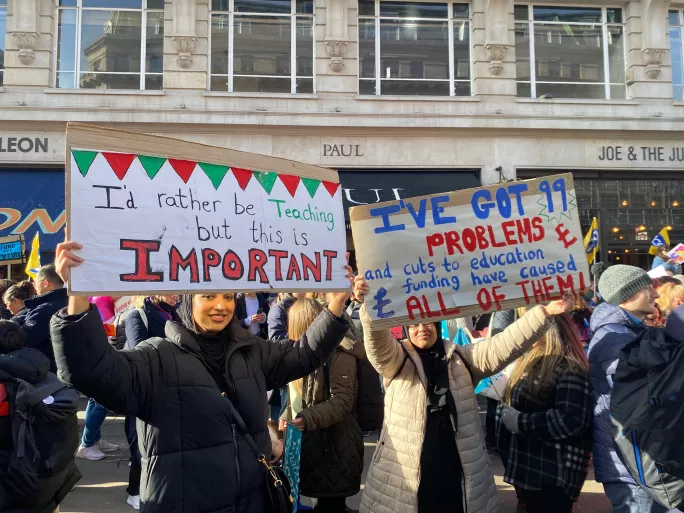
Teachers have turned out to march in towns and cities across England and Wales to demonstrate why they are striking today.
In London, placards were seen bearing slogans such as “This government requires improvement” and “I’d rather be teaching but this is important”.
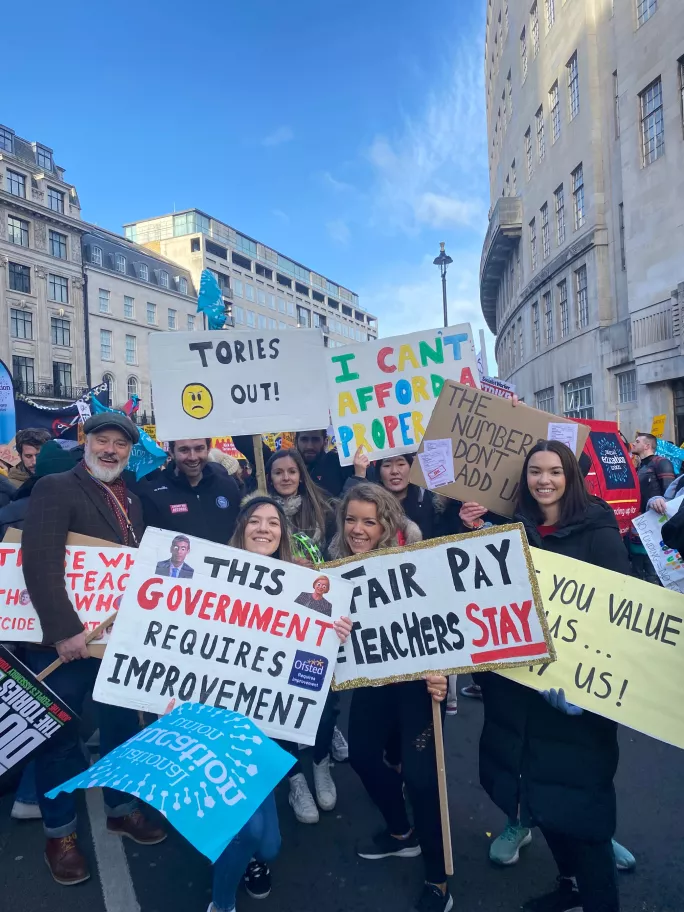
11:00
‘Never seen such strong support’
School leaders have been talking to Tes and posting on Twitter as the first morning of industrial action by teachers gets well under way.
Vic Goddard, co-principal of Passmores Academy in Essex, said 98 per cent of his NEU teacher-members were striking today, adding he’d “never seen such strong support”.
Meanwhile, Glyn Potts, headteacher at Newman RC College in Oldham, said 64 out of around 70 NEU members in the school were striking, which was around 65 per cent of his total teacher workforce, with additional absence as well.
He added that amicable pickets were taking place, but that the school was now planning for further industrial action dates “having understood how many intend on striking”.
Today’s action had made it “a little” easier to plan for future dates, but it was “still not ideal”, he added.
“It’s a shame we aren’t fully open but we are making the best of it,” he said.
A teacher from a school on the south coast, who contacted Tes but didn’t want to be named, said there was “much higher strike participation than expected” at their school, and therefore one year group the school had planned to be in had been sent home this morning.
“We are only running three year groups now,” they added.
10:20
NEU one of seven unions striking over pay today
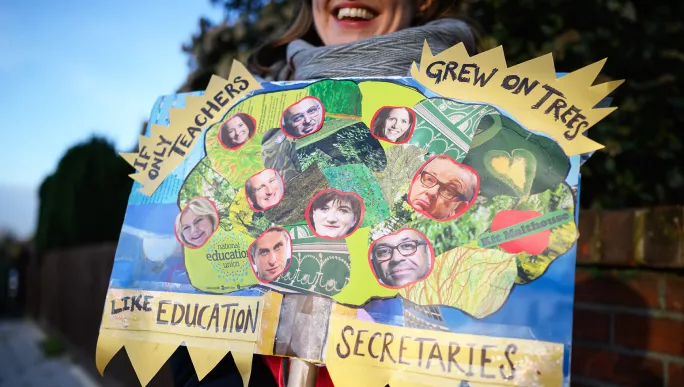
The NEU industrial action today is part of the most widespread strike seen in the country in a decade, with up to half a million workers across different sectors walking out in increasingly bitter disputes over pay, jobs and conditions.
Members of seven trade unions are taking industrial action, affecting schools, universities, trains and buses.
Civil servants, train and bus drivers and university staff also stopped work on the biggest single day of strikes in a decade.
Picket lines were mounted outside railway stations, schools, government departments and universities across the country, with unions saying they are receiving strong support from the public.
More than 100,000 members of the Public and Commercial Services (PCS) union are on strike, including UK Border Agency staff at ports and airports.
09:51
Bousted criticises Keegan over strike talks
Mary Bousted, the joint general secretary of the NEU, has criticised education secretary Gillian Keegan for failing to understand how to carry out pay negotiations.
Speaking to Tes at the picket line of Bishop Thomas Grant School in Streatham, South London, this morning, she said: “I don’t think Gillian Keegan knows what negotiations are. Negotiations are not half-an-hour meetings where the secretary of state says she has no political capital and can’t make a pay offer.”
She added that real negotiations should involve civil servants and union leaders talking for hours on end to “try to find a landing space between two different positions”.
09:06
‘Simplistic figures forget progression pay,’ says Keegan
The education secretary has said “everybody [is] taking simplistic percentage figures” to talk about teacher pay that “forgets progression pay”.
Speaking on BBC Radio 4 this morning as strikes over pay got under way across England and Wales, Gillian Keegan said that 40 per cent of classroom teachers would also get “progression pay”, meaning that this year “40 per cent will get up to 15.9 per cent, and of course that’s on top of a package that includes 23.6 per cent employer contributinory pension”.
She added: “Everybody taking these very simplistic percentage figures [to explain how pay has fallen or risen] forgets the progression pay, which there is with the bands of a lot of the public sector who are on strike at the moment.
“They also get time-based and promotion-based progression within their pay bands.”
Ms Keegan also claimed that teacher recruitment was only “harder in some areas”.
And she said the DfE “looks at” whether it could negotiate extra money for some teachers.
In answer to a question about more pay for certain subjects or parts of the country, she said: “Yes, we look at that. We have a recruitment and retention strategy, which we worked with the sector and the unions on and that was developed in 2019, implemented in 2021.
“Now, it’s difficult because obviously it was implemented in a pandemic year so we had bumper numbers one year and then below the previous year.”
Asked if there was a recruitment and retention crisis, she replied by saying “not overall”, but added: “We do have some areas that are much harder to recruit - so maths, physics and computer science specifically.
“For those, we have put in place in this strategy bursaries of up to £29,000, plus levelling-up premium awards in certain areas to attract those teachers of £3,000.
“But of course we want to make sure - and it is difficult to recruit, there is a massive shortage, a lot of people are after those skills - so of course we’ve said we’ll look at that, we’ll look at differential pay, if that makes sense”.
08:41
‘This is why there’s a strike today’
Former Department for Education senior policy adviser Sam Freedman has pointed out how primary school teachers in England have seen the slowest growth in average real-terms pay compared to other OECD countries.
“This is why there’s a strike today,” he writes in a Twitter thread this morning.
Mr Freedman has previously said that strikes were the “logical next step” of a sector stretched to breaking point in his Tes column.
08:32
Keegan: ‘Most schools will be open today’
Education secretary Gillian Keegan said she expects most schools will open today despite the strike by teachers.
She told BBC Breakfast: “We did do a survey and we have rung round a lot of schools as well, and that told us that the majority of schools will be open but some will have restrictions for different cohorts.”
Earlier, the education secretary said she was surprised that “it was the law” that teachers and schools are not required to report the expected level of disruption as a result of industrial action.
She added the legal position would remain “under review”.
“It was a surprise to some of us that was in fact the law. I did write to everybody urging them to be constructive, to let their heads know, and I am sure many teachers will have done that,” she told Times Radio.
“There are discussions around minimum service levels, minimum safety levels, around hospitals around rail - education is part of that bill as well.
“We are hoping not to use that; we are hoping to make sure we continue with constructive discussions and relationships but these things will always stay under review.”
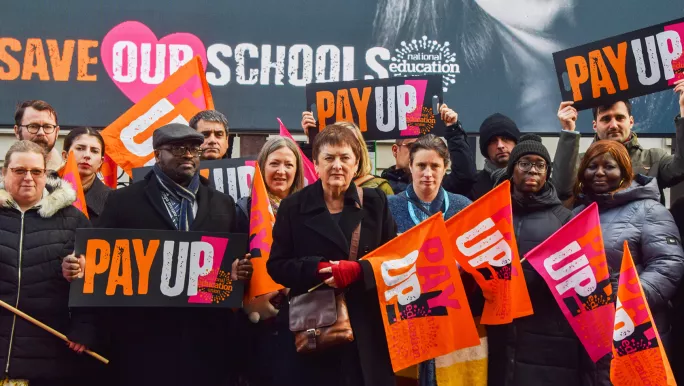
Tuesday 31 January
18:01
NEU expects more than 8 in 10 schools to be affected by its strike
The NEU has said that it expects around 85 per cent of schools to be affected by the action tomorrow.
The union told Tes that this is based on a sample of 8,000 of its school reps and volunteers.
More than 8 in 10 said their workplace would either be fully closed or only partially open as a result of striking staff.
16:43
No 10: ‘Disappointing’ lack of intel on strikes
Downing Street has said it is “disappointing” that school leaders do not know fully how many teachers will be available for work until the strike day itself.
The prime minister’s official spokesperson said: “It is disappointing that school leaders don’t have the clarity they need to plan appropriately.
“That would give parents the information they need about what level of care their children can expect, whether they will be able to send their children to school.
“It would help reduce disruption and help teachers and school leaders better plan to provide some level of education for their students.
“As a result, that’s not happening and the disruption will be greater and, obviously, that’s a matter of regret.”
16:36
Public support for teacher strike decreases with age
A poll from YouGov, which surveyed 5,092 adults in Great Britain, revealed that just over half (51 per cent) supported strike action by teachers over pay and working conditions.
40 per cent opposed the action, while 8 per cent said they didn’t know.
There are some interesting breakdowns by age, gender and politics:
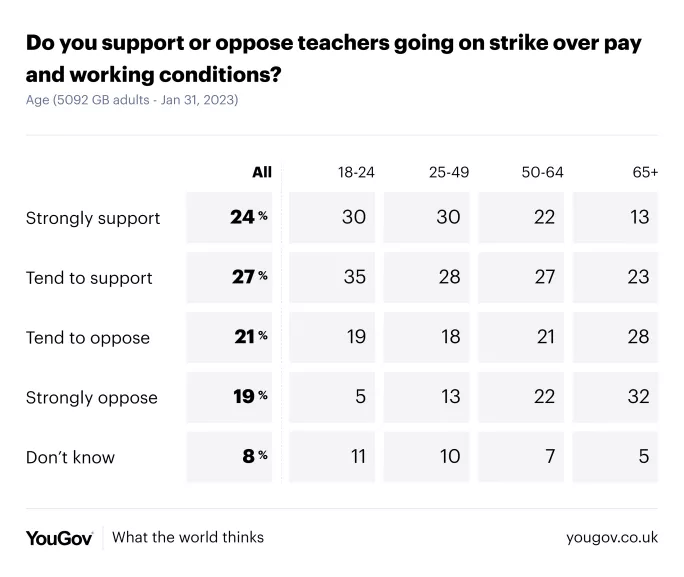
15:55
NEU membership grows by 40,000
Tens of thousands more teachers have joined the NEU since its strike action was announced two weeks ago, joint general secretary Kevin Courtney has announced.
Mr Courtney said that the new members, of which the vast majority are teachers, are joining the union because “they want to be part of the action” being launched tomorrow.
He added: “That’s a very big conscious decision to make, to join us at this moment. If I was the government, I’d be worried about that.”
Tes analysis last year found that across the four main education unions - the NEU, the NASUWT, the NAHT and the Association of School and College Leaders - membership had increased by nearly 46,000, or 6 per cent, since before the pandemic.
15:50
Keegan writes to schools ahead of strikes
Education secretary Gillian Keegan has written to school staff and leaders thanking them for “working so hard to prepare” for the strike action.
While Ms Keegan said she did not want to see any teacher taking strike action, she appreciated “those teachers who are NEU members who have given advance notice to their schools”.
She added: “I want to reassure you that I am listening to teachers and continuing to meet with trade unions. Together, we are working through a range of issues which includes pay, workload, flexible working, behaviour and much more.”
15:24
What do polls say about public support for teacher strikes?
Research from polls and surveys so far this week suggests around half of the public support the action - but this varies.
A Sky News poll yesterday revealed that almost half (49 per cent) of the public supported strike action by teachers.
Meanwhile, a Public First poll shared with Politico suggested that 43 per cent of the public believe strike action by teachers is justified, with this figure higher among parents with school-age children (47 per cent).
And a poll for The Independent found that more than half (54 per cent) supported teacher strikes, although this was lower than for other professions, such as nurses.
15:22
You can watch Kevin Courtney speaking about the strikes in this Sky News interview:
15:21
NEU joint general secretary Kevin Courtney has said it is “very appropriate” that teachers don’t tell school leaders whether they are striking.
His comments came amid criticism that schools were giving parents too short notice about whether they would close, and concern from some headteachers that making a decision on closures was difficult without knowing which staff would be on strike.
You can read the full story here.
15:20
Welcome to the Tes magazine teacher strikes live blog. We will be bringing you regular updates leading up to and on the strike day, with all the reaction and news from the government, the unions and schools.
topics in this article




